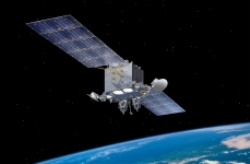The Netherlands has become the second Advanced Extremely High Frequency (AEHF) international partner to communicate using the Lockheed Martin-produced satellite system. During July testing, for the first time three nations used the system simultaneously as The Netherlands connected to U.S., Canadian and domestic terminals.
 The Netherlands became the second partner nation to use the Advanced Extremely High Frequency satellite system. The U.S. and Canada are already testing the system, and the United Kingdom will connect in the next several months.
The Netherlands became the second partner nation to use the Advanced Extremely High Frequency satellite system. The U.S. and Canada are already testing the system, and the United Kingdom will connect in the next several months.
AEHF provides vastly improved global, survivable, jam-proof, protected communications for strategic and tactical users on ground, sea and air platforms.
“AEHF’s ability to securely connect allies together is vital to current and future operations,” said Mark Calassa, vice president of Protected Communications Systems at Lockheed Martin. “We are hard at work delivering this global capability: Our fixed-price production builds are on schedule, we will launch a third satellite next week, and those users testing the system are extremely satisfied with this leap forward in capability.”
The U.S.-Canada-Netherlands team engaged AEHF-1 and AEHF-2 while completing test calls between international terminals. In separate tests, Dutch forces exchanged voice and data communications with the U.S. and Canada by connecting to the AEHF-2 satellite, crosslinking with AEHF-1 and downlinking to the U.S. Navy terminal in San Diego and a Canadian terminal at Shirley’s Bay, Ontario. By connecting with AEHF-2, The Netherlands also completed their first local AEHF call from ship to shore. Radios used in the tests include domestic and international versions of the Navy Multi-Band and Secure Mobile Anti-Jam Reliable Tactical (SMART-T) terminals.
The U.S. Air Force has been allowing select groups to use AEHF for testing as it fields the system, and the system has performed well as its user base grows with different terminal types. The Netherlands achievement follows Canada’s successful call in May. Both countries will continue testing for several months as they move toward initial operational capability. The United Kingdom is also scheduled to complete their first connection by the end of the year.
A single AEHF satellite provides greater total capacity than the entire legacy five-satellite Milstar constellation. Individual user data rates will increase five-fold, permitting transmission of tactical military communications, such as real-time video, battlefield maps and targeting data. In addition to its tactical mission, AEHF provides the critical survivable, protected and endurable communications links to national leaders, including presidential conferencing in all levels of conflict.
Lockheed Martin is under contract to deliver six AEHF satellites and the Mission Control Segment. Both AEHF-1 and AEHF-2 are on orbit, AEHF-3 was shipped for a September 18 launch and AEHF-4 is progressing on schedule. All satellites are assembled at the company’s Sunnyvale, Calif., facility.